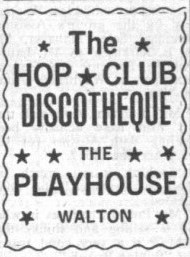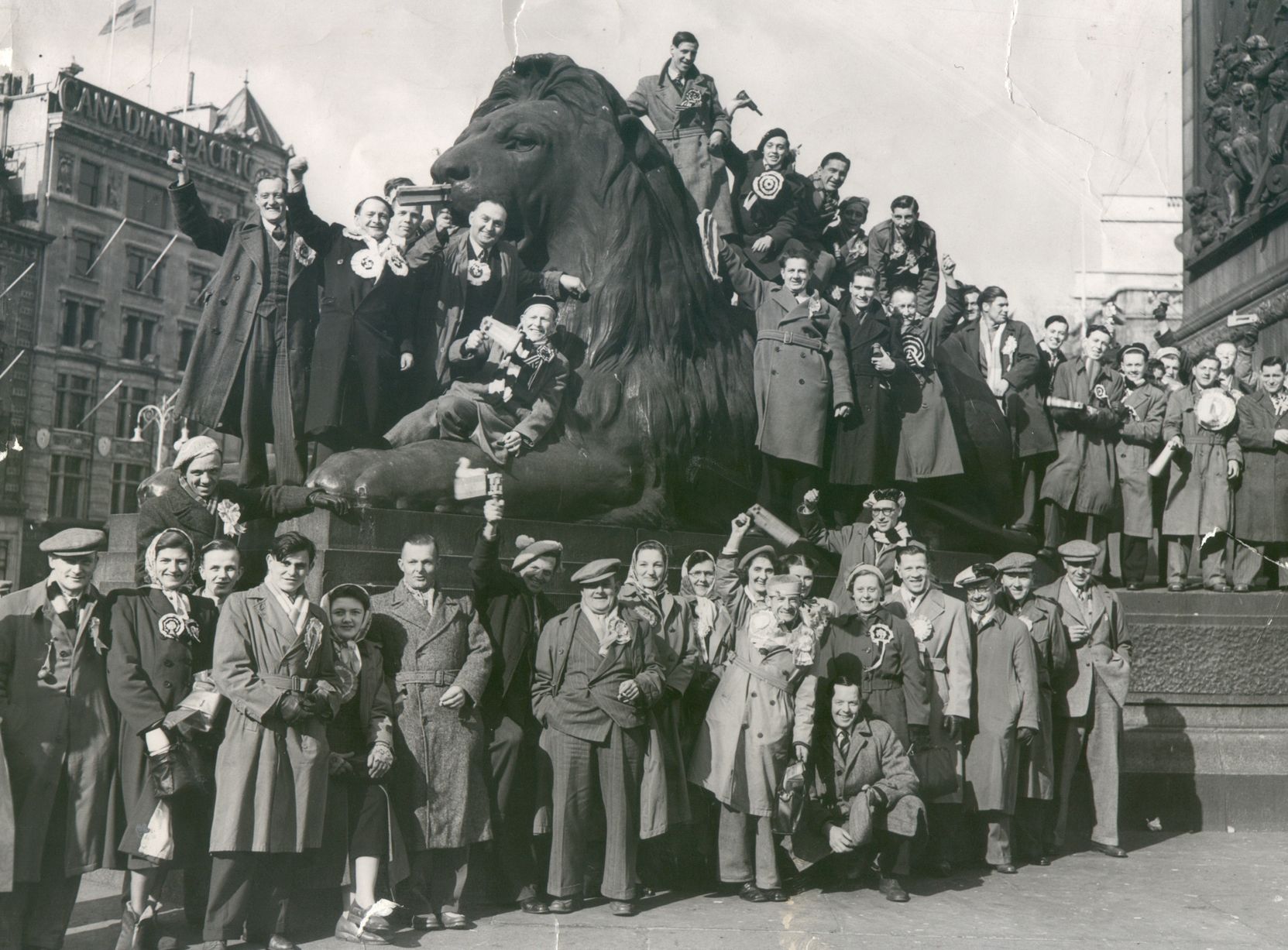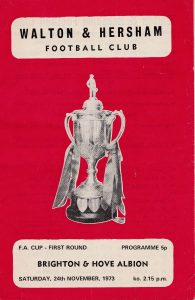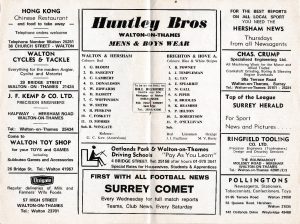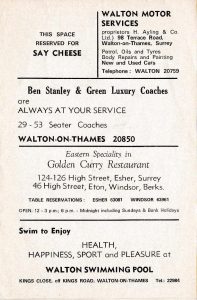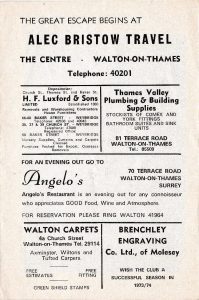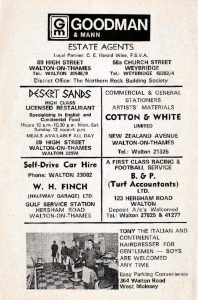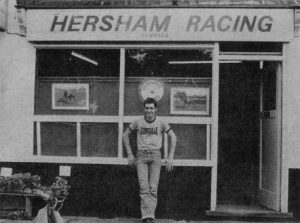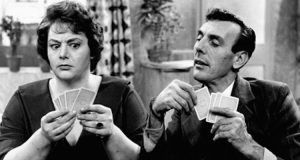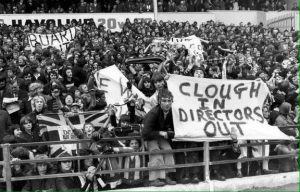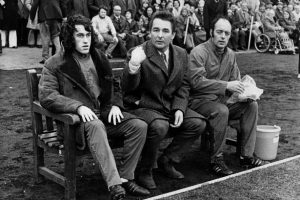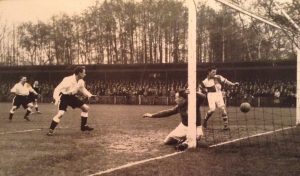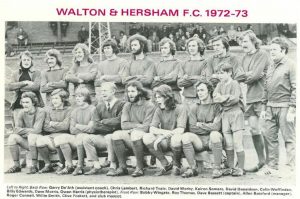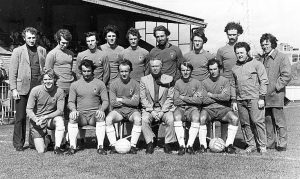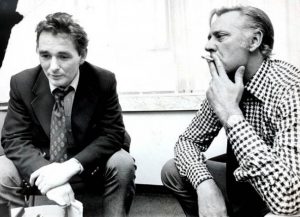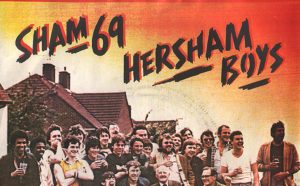The programme
This programme is from the FA Cup, first round game between Walton & Hersham and Brighton & Hove Albion on 24 November 1973. It was a 0-0 draw.
The game was classic upset material – a resilient, up-and-coming amateur side against a professional outfit low on confidence and struggling at the wrong end of Division Three. Walton & Hersham – the Swans – had reached Round 2 for the first time ever in 1972, where they lost disappointingly at home to Margate of the Southern League. Writing in today’s programme, John Whitbread of the Surrey Herald commented “For Brighton it will be vital not to become another giantkilling statistic.”
- 3
- 2
- 1
1. say cheese 2. wine and atmosphere 3. boys are welcomed
The programme adverts could have been made for Dave Roberts of The Bromley Boys, who captures the genre perfectly. “I vowed that I would give all my future business to those who advertised in the Bromley programme”, he recalls. “I would eat at the Khush Bhag Restaurant (‘Sophitication, Exotic Food’). For heating, I’d head straight to Comfort Zones Heating (Heating) Ltd, who I knew I could rely on for my ‘home heating comfort.’ My first choice of family baker would always be Stanley Wood ‘For crusty bread, cakes and pastries of quality and distinction.’ And in the unlikely event of needing floodlights, I’d simply pick up the phone and ring Reid & Barrow Ltd.”
The back story
Of the several diverse personalities connected with this clash of the &s, Jimmy Pursey arguably exerted the biggest influence on 70s football fans. Out of school and working at the Hersham greyhound track, local boy Pursey had been performing live since 1970 when – at the age of 14 – he drunkenly jumped on stage at the Walton Hop and began miming Bay City Rollers hits. Now, Pursey was rehearsing with Albie Slider, Billy Bostik and Neil Harris at Sliders’ parents’ pig farm. Although starting a band was still just an idea, the name was already waiting on a nearby wall. Here, a forgotten fan had commemorated the Swans’ Athenian League title win by spraying the words “Walton & Hersham 69”.
It’s fair to assume Sham 69 were never one of Eric Sykes’ favourite acts. He was a light comedy man, who at 50 years of age belonged to a different world altogether. Sykes had been creating TV scripts pretty much since the War. In the 50s he wrote extensively for Frankie Howerd, the Goons, Peter Sellers and Tony Hancock. In the 60s he moved into acting, which was particularly impressive given that he was almost completely deaf and had to rely on lip-reading other actors. He starred in his own series, Sykes, and created the stage character of a bumbling, idle, accident-prone bachelor. Hattie Jacques played his spinster sister, again eponymous, and by the early 70s Sykes was a popular sitcom broadcast in full colour.
Completing the Hersham boys of 1973 is the incomparable Brian Clough. Possibly feeling less than incomparable at the time of his visit to Stompond Lane, Clough and his assistant Peter Taylor had sensationally resigned from Derby the previous month, following a long-running and undignified feud with the club’s board of directors. Money was at the heart of it, but Clough’s outspoken ways provided a handy excuse. In the last six months alone he had described Juventus as “cheating bastards”, accused Don Revie of much the same thing and allegedly made a v-sign at Sir Matt Busby. So the men who won the League with Derby in 1972, and reached the European Cup semi-final the following spring, now found themselves in Division Three. Brighton were a poor side and the job was far from glamorous, but Clough needed an opportunity to prove himself. Mike Bamber, the ebullient Brighton chairman, gave him that opportunity.
The departure of Clough and Taylor was not smooth. Supplanted at the Baseball Ground by Dave Mackay, lynchpin of their late-Sixties side, they left behind a fanbase in revolt against the board and actively protesting against its role in the debacle. Even as the Brighton management duo took their places on the Stompond Lane touchline, Derby supporters were still in ferment at their team’s game against Leeds.
The Walton & Hersham ground boasted nothing so grand as a dugout. Characterised by an athletics track around the pitch, it was essentially an oval bowl with mainly uncovered terraces, a small stand with dressing rooms underneath and a ricketty cover on the far touchline. Its capacity was nominally 6,000, although it once packed in an unlikely-sounding 10,000 for a 1952 Amateur Cup game against Crook Town. In modern times the venue staged First Round Cup games against Southampton in 1958, Barnet in 1969, Telford in 1970 and Exeter in 1972.
Brighton met the home side at arguably the peak of their history. Just six months previously they lifted the FA Amateur Cup, beating Slough Town at Wembley in front of over 41,000 fans. Under their determined and driven manager Allen Batsford the team had first won the Athenian League, and then been accepted into the Isthmian League in 1971, finishing third at the end of their first season.
That Amateur Cup success gave the Swans exemption to the First Round proper. Now, in a game kicking off early due to the floodlight ban dictated by a National State of Emergency – the Heath government’s response to the double blow of the miners’ and power workers’ strike, and the Arab fuel crisis – they would take on Clough in a game he described as “donkeys against thoroughbreds”. In a career of ill-advised comments, this one would haunt him more than most.
The match, and the Goldstone Ground replay that followed it, have gone down in folklore. The story is told excellently here by Brighton fans’ site, www.thegoldstonewrap.com :
1973: Brighton 0-4 Walton & Hersham – Albion’s worst FA Cup defeat
Here is the team photo of amateurs Walton and Hersham, with ex-Albion players Colin Woffinden and Dave Sargent, plus future football manager Dave Bassett in the back row. And, in the front row, if Brighton supporters were not familiar with Clive Foskett at the start of the FA Cup 1st Round replay at the Goldstone,…
But back to Eric Sykes, and folklore of a different kind. Most accounts of the two games agree on the basic facts of an incident following the replay, when Clough came across Sykes using the telephone underneath Brighton’s stand and took exception to some of his comments. “I’d laughed my socks off whenever I saw him on TV”, recalled Clough in his autobiography. “But that afternoon I would have taken sheer delight in punching him.” So OK – Sykes annoyed Clough. Not quite the “argument” or the “fight” that some sources report. But what was Sykes doing there? In Clough’s recollection, “I think he was president of the Walton club, or at least held some position there.” In fact he is listed in the programme, along with 42 other people, as a “patron”. Maybe he lived locally. His famous silent comedy “The Plank” was filmed in Churchfield Road, Walton. Whatever, his gloating was the last thing Cloughie needed. “I’ve had some bad days in football”, he said. “But that must have been one of the worst.”
Looking forward
These two games were a high-water mark for the Swans. In the next round they played away to Hereford United of Division 3, and lost 3-0. But an even bigger blow was the departure of Allen Batsford in the summer of 1974. Batsford recognised that he had taken the amateurs of Walton & Hersham as far as he could. He wanted a new challenge, and found it at Southern League outfit, Wimbledon. There, he inherited only a partial side. He made up the shortfall with the spine of his team from Stompond Lane. Dave Bassett, Dave Donaldson, Billy Edwards, Roger Connell and Kieron Somers all followed their manager out of the door.
Thus it was that Batsford’s Wimbledon won three Southern League titles in a row, gained national prominence by starring in (and winning) high-profile Cup-ties against top-flight teams, and were promoted into the Football League in 1977. For Walton & Hersham another FA Cup adventure, in which they lost narrowly to Malcolm Allison’s Crystal Palace, was a temporary flicker. They were relegated in 1975. Since then they have mainly played in the Isthmian League second tier, occasionally visiting the top flight but coming close to extinction more than once. Stompond Lane was controversially sold for housing in 2017. The Swans are now in the Combined Counties League and based at the Elmbridge Sports Hub, which does at least superficially resemble their old home.
Having been embarrassed by Walton and Hersham, Brighton plumbed new depths in their next game and lost 8-2 at home to Bristol Rovers. Clough kept them up that season, but they finished only two places above the relegation zone. This distinctly average record didn’t stop Leeds United courting him as a replacement for new England manager Revie, a surprising move given Clough’s previous fierce criticism of them both. Taylor stayed on a further year as Brighton boss before rejoining Clough at Nottingham Forest in the summer of 1976.
As for Jimmy Pursey, Sham 69 became one of the most commercially successful punk bands of the era (enough to damn them in many eyes), but found their gigs bedevilled by rent-a-mob skinheads from the National Front’s musical wing. This situation wasn’t helped when Pursey joined Rock Against Racism, and by the time the band released Hersham Boys in 1979 they were finished as live performers and split a year later. Although the song appeared on an album – The Adventures of the Hersham Boys – universally slated, for me the critics missed the point somewhat. Hersham Boys is a pisstake, a self-denigrating sideswipe at suburban rebellion. What else could “country slang with a Bow bell voice” ever be? But that was always the Pursey way. Like Clough, he spent the Seventies saying things that other people chose to misinterpret.
Eric Sykes turned his back on football and became a director of Oldham Athletic. He never did meet Brian Clough.
